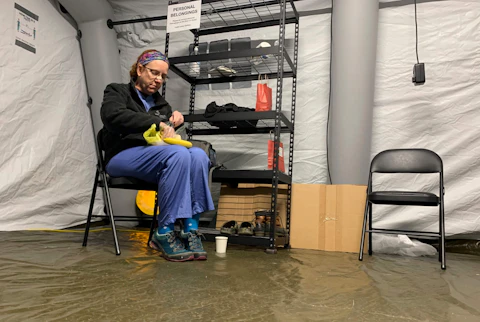North Carolina’s flagship public university has been the scene of numerous race-related controversies in recent years, including white supremacist rallies around a Confederate monument.
North Carolina’s flagship public university is not safe for Black students.
That was the message a group of Black student leaders and faculty had Wednesday, after the accomplished journalist Nikole Hannah-Jones turned down a tenured professorship at the University of North Carolina at Chapel Hill’s journalism school.
“The environment at UNC is toxic and traumatic, not only for students but also for faculty too,” said Julia Clark, a student leader with UNC’s Black Student Movement group, Wednesday in Chapel Hill. “And so there’s no reason why we should be encouraging students to come to this university that has no intention of accommodating them.”
Facts come first, always. Follow us on Facebook, Twitter, and Instagram.
Clark said she was punched last Wednesday by acting UNC Police Chief Rahsheem Holland when he and other campus police forcibly pushed students out of a meeting room where trustees were meeting to consider Hannah-Jones’ tenure.
Holland referred comment to UNC media relations representatives when Cardinal & Pine reached him by phone. In a statement released late Wednesday night, UNC Chancellor Kevin Guskiewicz said he reviewed the requested actions, and is also asking for an external review of officers’ body camera footage.
A bruise was visible on Clark’s face after the altercation.
The student groups are demanding Holland’s termination, as well as several other requests of university administrators.
Interference in University Hire of Renowned Journalist
Hannah-Jones was recruited to become the next Knight chair in UNC’s Hussmann School of Journalism and Media. But Walter Hussman, an Arkansas newspaper publisher and major donor whose name is attached to the journalism school, intervened by contacting members of the UNC Board of Trustees to express his own misgivings about giving tenure to Hannah-Jones. Hannah-Jones is a UNC alumna, and a MacArthur Genius Award recipient and Pulitzer Prize winner who spearheaded the New York Times’ “1619 Project,” which examined the role slavery played in the nation’s founding through today.
The trustees, who are political appointments, delayed holding a vote on Hannah-Jones’ tenure until last week. She announced Tuesday she would be taking a job at Howard University, citing UNC’s treatment of herself and Black students as reason why she could not come to the North Carolina campus.
“I cannot imagine working at and advancing a school named for a man who lobbied against me, who used his wealth to influence the hires and ideology of the journalism school, who ignored my 20 years of journalism experience, all of my credentials, all of my work, because he believed that a project that centered on Black Americans equaled the denigration of white Americans,” Hannah-Jones wrote in a statement. “Nor can I work at an institution whose leadership permitted this conduct and has done nothing to disavow it.”
The fallout at UNC
But the way Hannah-Jones was treated was far too familiar for some. Black scholars and students on campus say they’ve been calling for changes for too long with too much inaction.
A prominent Black chemist said she would not come to UNC because of the way it handled Hannah-Jones’ hiring.
But it’s not the first time the university’s handling of issues affecting Black students and faculty has attracted this level of attention.
The decision by university administrators to enter into a secret agreement in 2019 to pay $2.5 million to the NC Sons of Confederate Veterans was controversial. That followed the 2018 toppling of the Silent Sam statue on campus by anti-racist demonstrators, after decades of pleas from students and others affiliated with the university to remove the statute. Silent Sam was erected during North Carolina’s Jim Crow era as an homage to the Confederacy.
Stand-offs over the statue had brought renewed attention and visits to the campus by white supremacy groups.
That made the campus feel unsafe, with the university failing to stand up for its students of color, said De’Ivyion Drew, a senior studio arts major who has worked on safety issues on campus.
“We will continue to struggle to bring marginalized students and others in our community into a space where each student feels valued and included,” Drew said. “But we cannot do it alone, and we cannot succeed in this current environment.”
Among the demands outlined on Wednesday by the Black Student Movement and Black Faculty Caucus were:
· Issue anti-racist alerts when known white supremacists are on campus
· Terminate Interim UNC Police Chief Holland
· Hire Black counselors and increase the numbers of Black staff at the campus’ Title IX and Women’s Center
· Improve the recruitment and retention of Black faculty
· Issue equity score cards for each department
· Create a memorial for James Cate, a Black Chapel Hill man stabbed to death on campus in 1970. Members of a white supremacist group were charged in his murder but not convicted.
· Bring attention and restore the Unsung Founders Memorial which commemorated the enslaved people who built the public university.





